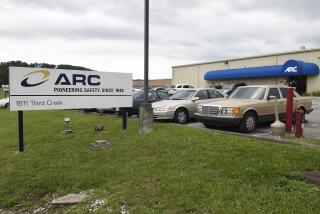Toyota president repeats apologies in China
- Share via
Reporting from Beijing — Apologizing several times and bowing twice, Toyota President Akio Toyoda arrived in the world’s largest automotive market to assuage fears about the safety of his company’s vehicles.
“The global recall has caused a lot of worries and confusion among Chinese consumers. We want to apologize sincerely,” Toyoda said in a Monday news conference before bowing in front of hundreds of Chinese journalists.
Flanked by seated Toyota executives, Toyoda stood and read a prepared statement explaining that he rushed to Beijing as quickly as possible after testifying at a congressional hearing in the U.S. last week.
In remarks similar to those delivered in Washington, Toyoda told the Chinese media that Toyota’s safety problems were linked to the company’s rapid expansion. He said the automaker was now doing all it could to remedy its problems.
“Toyota thinks when something like this happens it’s very important for automotive manufacturers not to hide anything and put the customers’ safety first,” Toyoda said.
Toyoda’s reference to transparency follows allegations made last week by Rep. Edolphus Towns (D-N.Y.), chairman of the House Oversight and Government Reform Committee, who said Toyota Motor Corp. “deliberately withheld” evidence in lawsuits related to vehicle safety, exhibiting a “systematic disregard for the law.”
Toyota has issued about 10 million recall notices worldwide recently, and dozens of deaths have been blamed on problems with the company’s cars.
At least 56 people have died in traffic accidents in the U.S. in which sudden unintended acceleration of Toyota vehicles has been alleged, according to a Times analysis of public records, including lawsuits, police reports and complaints filed with the National Highway Traffic Safety Administration.
China represents only a small fraction of the cars that have been recalled worldwide, with 75,552 RAV4 sport utility vehicles recalled in January because of malfunctioning gas pedals.
China is a critical market for Toyota, which is looking for growth beyond mature markets such as the U.S. and Japan, analysts said.
“He needed to go straight to the Chinese people and control the damage,” said Jia Xinguang, an independent auto analyst based in Beijing. “Chinese media and consumers are paying a lot of attention to the recalls.”
Analysts said in February that U.S. auto sales figures to be released Tuesday are likely to show Toyota losing market share to rivals, driven in part by negative publicity from the recalls and congressional hearings.
“We anticipate Toyota offering generous consumer incentives with hopes of bringing buyers back to their showrooms in the coming weeks,” said Jesse Toprak, vice president of Industry Trends and Insight for TrueCar.com.
Toyoda said the recalls in China were not as expansive as in the U.S. because problems were restricted to gas pedals made by CTS Corp. The Indiana company supplied accelerators for the Chinese RAV4s.
Floor mats were not the issue in China that they were in North America because Chinese models were not outfitted with thick, plastic mats, Toyoda said.
“Different countries have different roads so we need to make different cars for them,” Toyoda said. “Just like the dish mapo tofu [a famous Asian dish]. Although it’s the same dish, it tastes different in every country. But all of our cars are made following the same quality-control standards.”
Toyoda also outlined plans for a global quality control committee that he would lead. The goal was to quickly assess reports from customers and deliver the information to inspection and research and development departments, he said.
There is a feeling among some of the Japanese public that U.S. congressional hearings on the recalls are aimed at propping up Toyota’s largest American rival, General Motors Co., which taxpayers bailed out last year. Toyoda was asked by a reporter at the China Youth Daily if he believed the U.S. scrutiny was conspiratorial.
“We have 20 million customers in the U.S. and hire about 200,000 people,” Toyoda responded. “To attend the hearing and talk to them face to face, I’m very thankful I was given such an opportunity.”
Toyota’s passenger vehicles account for about 7.5% of the Chinese market. That’s made the company the No. 2 brand in China. But top-selling Volkswagen commands about twice the market share, according to J.D. Power and Associates Inc.
Total vehicle sales in China grew by nearly 50% last year to 13.6 million, allowing China for the first time to surpass the U.S. as the largest auto market. About 10.4 million new vehicles were sold in the U.S. last year.
Chinese sales have been sluggish for Toyota, which has been focusing on larger cars at a time when the market has been favoring economical, fuel-efficient automobiles. Toyota’s passenger car sales grew by 14% last year. By comparison, Hyundai grew by 87%, Nissan increased 46% and Buick expanded 59%.
Despite this, Toyoda said he expected the company to reach its sales target of 800,000 vehicles, an increase of 150,000 from 2009.
“With the auto market growing so fast, we hope to top that sales figure this year,” he said.
[email protected] Tommy Yang in the Times’ Beijing bureau contributed to this report.







